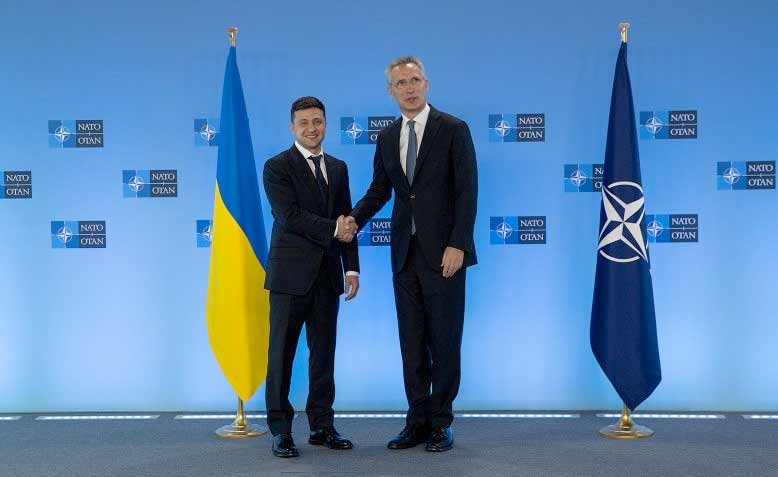 Zelensky and Stoltenberg in Brussels. Photo: Presidential administration of Ukraine / Wikimedia Commons / CC BY 4.0, license linked at bottom of article
Zelensky and Stoltenberg in Brussels. Photo: Presidential administration of Ukraine / Wikimedia Commons / CC BY 4.0, license linked at bottom of article
The banning of opposition parties and media clampdown in Ukraine underline the need for an anti-war war position independent of Zelensky, argues Kevin Ovenden
Most of the western media has focused solely upon the banning of 11 opposition parties. Most of those are small. Some are highly reactionary. But they include three larger parties and one with 43 MPs in the parliament. It expelled one MP for not condemning the Russian invasion.
The party did condemn it and called on people to join the territorial defence. So it is not true that this anti-democratic diktat is driven by self-defence. Parties calling for national self-defence have been banned. This piece by Volodymyr Ischenko, a Ukrainian academic researcher and socialist based in Berlin, provides an excellent analysis of why this has happened and why appeals to national security are a smokescreen.
As he says:
“The irony is that the suspension of these parties is completely meaningless for Ukraine’s security. It is true that some of the suspended parties, like the ‘progressive socialists,’ were strongly and genuinely pro-Russian for many years. However, practically every leader and sponsor of these parties with any real influence in Ukraine condemned Russia’s invasion, and are now contributing to Ukraine’s defence.”
Instead of being based on national security – which have states imposing authoritarian clampdowns, including Russia – the bans seem much more aimed at knocking out opponents and shifting the political balance.
We don’t hear it from so much of the propaganda-driven corporate and state media in the West, but the Zelensky government was far from popular before this crisis and invasion. And not only was it over the East/West schism of which way Ukraine would be pulled between Washington and Moscow. It was also over authoritarianism, corruption and a crisis of living standards.
Even less commented upon is that the Ukrainian government has seized control of all broadcasting media. In the kind of euphemism beloved of authoritarian regimes, all broadcasters have been brought onto a single ‘platform’ because of the need for a ‘unified information policy’. In other words, media freedom has been abolished under martial law.
No, this does not legitimise the Russian government’s justification of the invasion.
It does, however, demonstrate that while the Ukrainian people have every right to self-determination, that does not mean we or they have to support the corrupt and authoritarian Ukrainian state and government.
The anti-war movement said exactly this over the US invasion of Iraq. We said that stopping the war and invasion by the US did not mean support for Saddam Hussein and his government. Indeed, exiled Iraqi socialists and democrats were part of the anti-war movement on that basis. It was the US and British governments and the pro-war media that smeared the Stop the War Coalition as pro-Saddam.
Now we have a situation where the anti-war movement opposes the Russian invasion but is taken to task by those pro-war forces for not suspending all criticism of the Ukrainian government and our opposition to its own authoritarian measures.
We should not expect consistency from these people. Except in this: we oppose these wars, they back them based on the policy of the biggest powers – the ones organised in Nato. The number of dead Iraqis and Ukrainians and whoever else is incidental. Or do we really believe that the Pentagon and the US and British states genuinely care about these things? That Boris Johnson bats an eyelid about those starving now in Afghanistan while he lies about his insistence on rescuing dogs instead?
As we flatly call for the withdrawal of Russian troops, we should not take lessons from those who attack the anti-war movement today and who insist on no criticism at all of the anti-democratic regime in Ukraine. Instead, we should look to the peoples of Ukraine and Russia themselves. To below, not to the elites. And we can only do that in good conscience and with any credibility of we look to mobilising the mass of people where we are on the same basis – against war, the system that produces war, the new militarism, and for putting working people first globally.
Before you go
Counterfire is growing faster than ever before
We need to raise £20,000 as we are having to expand operations. We are moving to a bigger, better central office, upping our print run and distribution, buying a new printer, new computers and employing more staff.

